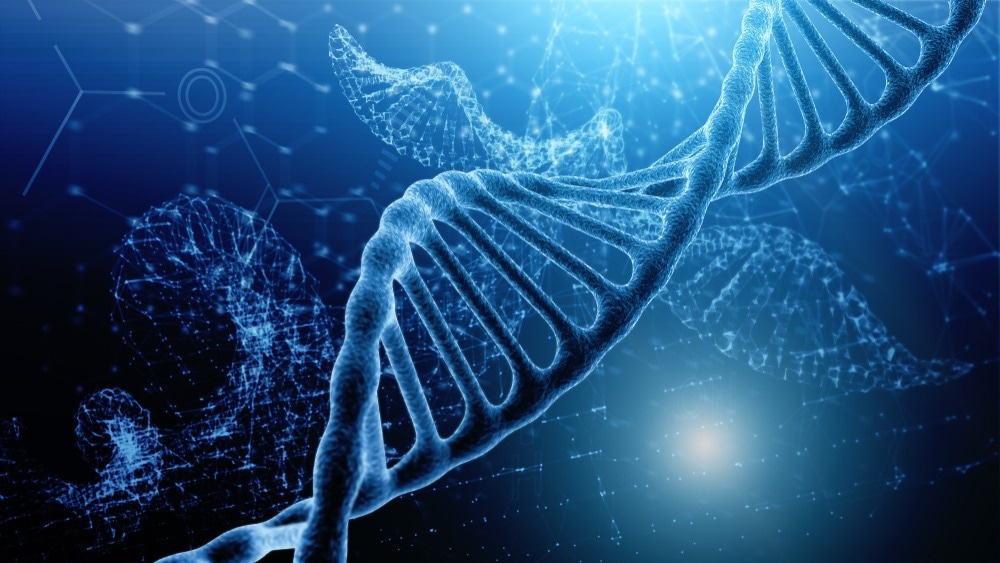Genetics plays a key role in precision medicine because genetic material largely determines inherited diseases and our resilience to respond to stressful pathophysiological conditions. The human genome is mainly composed of a type of sequence known as "dark matter", which comprises both non-coding regulatory regions and coding regions that encode functionally unknown proteins. Over the last few years, the importance of the dark genome (as well as its unexplored gene sequences) has become more apparent.

Image Credit: Timofeev Vladimir/Shutterstock.com
The role of Genomics in Precision Medicine
Precision medicine is a type of personalized medical therapy designed to treat health concerns by focusing on patients' health needs. Genomics is a science field that deals with an organism's genetic material (i.e., the genome), the interactions between genes, and the environment. The human genome comprises coding regions capable of synthesizing proteins that play diverse therapeutic roles in the human body (e.g., antibodies, anticoagulants, growth factors, etc.) and non-coding regions that modulate gene expression patterns. Both coding and non-coding sequences have major roles in determining the intrinsic inherited predisposition to suffer certain diseases and genetic disorders.
What does the "Dark Genome" mean?
The term 'dark genome' refers to the main constituent of the human genome, non-coding, previously regarded as "junk" DNA. This 'dark mater' may eventually also contain coding-gene sequences with functions that are not defined yet.
The dark genome contains nucleotide repeat sequences of variable length, which can be divided into tandem repeats (e.g., microsatellite DNA, minisatellite DNA, VNTRs sequences, simple repeats) and dispersed repeats scattered at more or less random positions across the genome.
Both tandem and dispersed repeats can have transposable elements, non-coding regulatory RNA sequences, and genes with unknown functions.
Genetic Predisposition, Personalized Genomic Medicine, and Dark Genome
A genetic predisposition is an association between genetic variation and the likelihood of suffering a subsequent condition, a type of relationship that may vary depending on the environmental conditions. Many complex diseases exhibit genetic predispositions (e.g., cardiovascular diseases, cancer, diabetes, etc.).
On the other hand, personalized genomic medicine is a practice aimed at providing healthcare based on the genetic patient's predisposition to suffer certain diseases and/or disorders, which can be efficiently diagnosed by determining the presence of nucleotide sequence polymorphisms linked to susceptible phenotypes.
The dark genome has essential roles in complex multifactorial diseases, especially in diverse types of cancer associated with gene deregulation and epigenetic modifications. The non-coding genome regions have regulatory functions and are predominantly associated with faulty gene expression patterns. These non-coding regions may include different types of functional sequences such as, among others, enhancers, promoters, gene suppressors, etc. The main constituent of the genome's dark matter consists of Transposable Elements (e.g., LINE1 elements), which may play important roles during development and evolution.
Moreover, it has also been shown that coding-gene sequences within dark matter can modulate diverse metabolic pathways and physiological functions inside a cell. These 'dark genes' are mainly located in repeat nucleotide sequences and, thereby, are harder to assemble and sequence. It is for that reason that they encode relatively unknown proteins. Full characterization of how dark genes function can provide new therapeutic possibilities for treating complex multifactorial diseases.
Dark Genes in Precision Medicine
Some important dark genes that have been identified to date and are located in the non-coding part of the human genome include:
- Leucine-Rich Repeat Containing 10 (LRRC10): associated with heart defects such as congenital anomalous left coronary artery and dilated cardiomyopathy.
- SLX4 Interacting Protein (SLX4IP): a member of the SLX4 structure-specific endonuclease (SSE) complex. SLX4IP promotes epigenetic pathways such as the Sumoylation of the rap1 gene (a key cellular mechanism that regulates NF-κB activity) and also plays roles in DNA repair.
- Extracellular Leucine-Rich Repeat And Fibronectin Type III Domain Containing 1 (ELFN1): a member of leucine-rich repeat (LRR) neuronal adhesion family proteins involved in synapse formation and fine-tuning properties of neural circuits.
- Vacuolar Protein Sorting 13 Homolog D (VPS13D): involved in cognitive disorders such as Spinocerebellar Ataxia (SCA). SCA is an inherited disorder characterized by progressive neurological deterioration and loss of motion.
- Heat Shock Transcription Factor 2 Binding Protein (HSF2BP): involved in modulating Heat Shock Transcription Factor 2 (HSF2) activation and associated with a genetic predisposition to suffer Premature Ovarian Failure 19 (POF19). Primary ovarian insufficiencies are characterized by irregular menses and reproductive problems (infertility).

Image Credit: bangoland/Shutterstock.com
Future Avenues of the Dark Genome in Precision Medicine
The above examples represent only a minor portion of the overall therapeutic possibilities that targeting the dark genome holds in genomic medicine. Mutation in non-coding nucleotide sequences has also recently been involved in inherited disorders by driving the deregulation of essential genes and thus impairing normal cellular phenotypes and/or metabolic functions.
In the near future, it is expected that the dark genome will shed new light on genome function and will be exploited to treat complex diseases.
Continue Reading: Exploring the Dark Genome
Further Reading
Last Updated: Nov 23, 2022